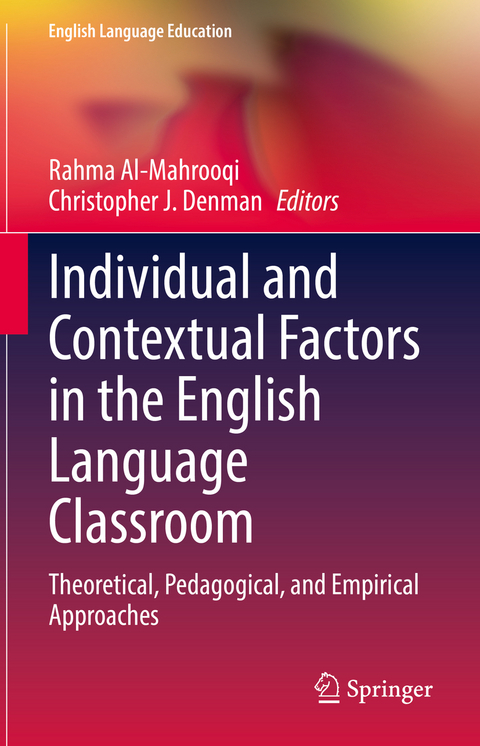
Individual and Contextual Factors in the English Language Classroom
Springer International Publishing (Verlag)
978-3-030-91880-4 (ISBN)
This edited volume examines a number of topics related to the roles of individual and contextual factors in English as second or foreign language (ESL/EFL) settings by presenting chapters across the three sections of theoretical and pedagogical approaches, teacher and learner research, and research into the roles of technology. The book has a focus on practical actions and recommendations related to individual and contextual factors in ESL/EFL, with a specific concern with issues of cognition, metacognition, emotion, and identity, and offers perspectives from a diverse range of international education settings. For teachers of ESL/EFL, the effective recognition and integration of individual and contextual factors into the classroom may represent a significant challenge. This is often the case in those settings where native English speaking teachers work in foreign language contexts where they may have limited understanding of local cultures and languages, or where language instructors have class groups that are culturally and linguistically diverse. In these, and similar, contexts, the types and extent of individual and contextual factors impacting on language learning may challenge both learner and instructor expectations of what an effective and supportive classroom is. While such a situation offers numerous opportunities for learners and teachers to expand their knowledge of themselves and each other, it also presents the possibility for ineffective teaching and learning to occur. It is within this framework that the book presents the latest theoretical, pedagogical, and research perspectives from around the world, thereby providing a resource for all stakeholders with an interest in the roles individual and contextual factors play in the English learning process.
lt;p>Rahma Al-Mahrooqi was appointed the Sultanate of Oman's Minister of Higher Education, Research and Innovation in 2020, following her time as the Deputy Vice-Chancellor for Postgraduate Studies and Research at Sultan Qaboos University from 2016-2020. Among her positions as a Minister, she is the Chair of Sultan Qaboos University Council, the Oman Authority for Academic Accreditation and Quality Assurance of Education (OAAAQA) Board of Directors, and Board of Trustees of the College Al-Shari'a Sciences. In addition to her current position, she has coordinated tertiary-level English courses and programs, been the director of one of the largest English language centres in the region, and published widely on English language teaching and learning.
Christopher Denman is a researcher at the Office of the Deputy Vice-Chancellor for Postgraduate Studies and Research at Sultan Qaboos University, Oman. He was previously affiliated with the university's Humanities Research Centre and was also an instructor at its Language Centre, following from English teaching experience at the secondary and tertiary levels in Australia, South Korea, and Japan. He has published and presented widely, in addition to being a co-editor of several volumes concerned with various aspects of English language instruction within the Arab world and internationally.
Introduction; R. Al-Mahrooqi, C. J. Denman.- Part I: Theoretical and Pedagogical Approaches.- Cognition and Emotions in the Light of ELL/ELT Competencies; G. R. Hovhannisyan.- Reducing Learners' Cognitive Load and Emotional Challenges Created by Lexis: The Andragogical Approach to Enhance Adult Learners' Mental Lexicon; T. Deveci, M. Saleem.- Language Test Feedback and Learner Personality; K. Burnell.- The Architecture of Language Personality; G. R. Hovhannisyan.- From Scribbles to Launch: Creative Writing in an Omani Classroom; Y. Ladha.- An Evaluation of the Conceptual Validty of Vowel Blindness as an Explanation for Differences in Arabic Readers' L2 Word-recognition; A Allmark.- Part II: Research Perspectives: Teachers and Learners.- Learners' Willingness to Communicate, Motivation, and Classroom Activity Preferences: Realities from the Iranian EFL Context; A. Ali Rezaee, M. Ghanbarpoor.- Affecting Students` Motivation to Foster Foreign Language Acquisition: Juggling Pedagogical Tools and Psychological Diagnostics in the University Classroom; K. Chiknaverova, O. Obdalova.- Escaping the Confines of Essentialism: Re-conceptualizing New Spaces of Identification among Native and Nonnative ESL Teachers; F. B. Rashed.- The Effect of English Study at School on Later Foreign Language Learning: How Chinese People Experience Learning and Using Japanese While Living and Studying Overseas; L. Zhang, D. Coulson.- Introducing Swalesian Genre-pedagogy to Arab EFL learners: A Case Study; P. Mathew, G. R. Kiran, R. L. Sankara Narayanan.- Quantifying Quality: Examining a Middle Eastern Tutorial Centre; R. McDonald, S. Finlay.- Metacognition and Language Learning on an International Foundation Programme; S. Herron.- Part III: Research Perspectives: The Role of Technology.- Construction and Launch of a Virtual Reality Laboratory for EFL Learners: A Crossroad between Cognitive and Emotional Learning; R. Hoffman, F. Ibrahim, J. Shakeel-Ahmed.- Language Learner Identity and Gamesand Gamification in the Language Learning Classroom: Observations from the Japanese Context; B. Thanyawatpokin, C. Vollmer.- Grasping Omani Students' Transitional Challenges: Focus on Computer Self-Efficacy and English Proficiency; V. Tuzlukova, H. Ginosyan.- Nonverbal Indicators of Comprehension among L2 Users of English Interacting with Smart Verbal Software Agents; A. Y. Ofemile.
| Erscheinungsdatum | 24.03.2022 |
|---|---|
| Reihe/Serie | English Language Education |
| Zusatzinfo | XVI, 391 p. 1 illus. |
| Verlagsort | Cham |
| Sprache | englisch |
| Maße | 155 x 235 mm |
| Gewicht | 769 g |
| Themenwelt | Schulbuch / Wörterbuch ► Wörterbuch / Fremdsprachen |
| Geisteswissenschaften ► Psychologie ► Pädagogische Psychologie | |
| Geisteswissenschaften ► Sprach- / Literaturwissenschaft ► Sprachwissenschaft | |
| Sozialwissenschaften ► Pädagogik ► Schulpädagogik / Grundschule | |
| Schlagworte | Creative writing in an Omani classroom • ELL • ELT • Emotion, cognition and identity in English language education • English language teaching and cognition • English language teaching and emotion • Foreign language learning • Interacting with Smart Verbal Software Agents • Iranian EFL context • L2 word recognition • Pedagogical tools • Psychological diagnostics in the University classroom |
| ISBN-10 | 3-030-91880-7 / 3030918807 |
| ISBN-13 | 978-3-030-91880-4 / 9783030918804 |
| Zustand | Neuware |
| Haben Sie eine Frage zum Produkt? |
aus dem Bereich


